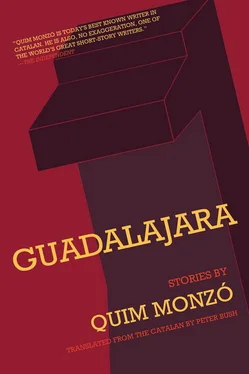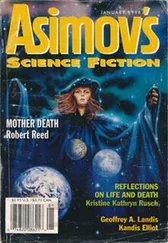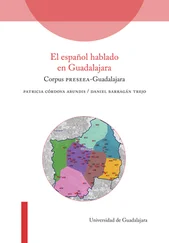Quim Monzó - Guadalajara
Здесь есть возможность читать онлайн «Quim Monzó - Guadalajara» весь текст электронной книги совершенно бесплатно (целиком полную версию без сокращений). В некоторых случаях можно слушать аудио, скачать через торрент в формате fb2 и присутствует краткое содержание. Год выпуска: 2011, Издательство: Open Letter, Жанр: Современная проза, на английском языке. Описание произведения, (предисловие) а так же отзывы посетителей доступны на портале библиотеки ЛибКат.
- Название:Guadalajara
- Автор:
- Издательство:Open Letter
- Жанр:
- Год:2011
- ISBN:нет данных
- Рейтинг книги:3 / 5. Голосов: 1
-
Избранное:Добавить в избранное
- Отзывы:
-
Ваша оценка:
- 60
- 1
- 2
- 3
- 4
- 5
Guadalajara: краткое содержание, описание и аннотация
Предлагаем к чтению аннотацию, описание, краткое содержание или предисловие (зависит от того, что написал сам автор книги «Guadalajara»). Если вы не нашли необходимую информацию о книге — напишите в комментариях, мы постараемся отыскать её.
Guadalajara — читать онлайн бесплатно полную книгу (весь текст) целиком
Ниже представлен текст книги, разбитый по страницам. Система сохранения места последней прочитанной страницы, позволяет с удобством читать онлайн бесплатно книгу «Guadalajara», без необходимости каждый раз заново искать на чём Вы остановились. Поставьте закладку, и сможете в любой момент перейти на страницу, на которой закончили чтение.
Интервал:
Закладка:
The Lives of the Prophets
– 1 –
The man gets up, eyes sparkling, breathing feverishly, with one aim in mind: to reveal to the world what has just been revealed to him. He rubs his eyes; the revelation is still crystal clear. Until this moment, he would have found it difficult to accept that he could suddenly become a prophet. Now, on the contrary, he discovers he can assume the role with the requisite faith and sang-froid . As he hurries downstairs in his pajamas (his mission is too momentous to worry about trivial details like finding his pants, shirt, and jacket), the trumpet blasts still echoing round his head, he sees his wife in the kitchen getting breakfast ready and their child bawling in his cot. His wife is surprised to see him up so early. She tells him so, but he doesn’t hear her because he’s already opening their front door and stepping out into the street, determined to divulge his revelation. He reaches the square, sees a green Volkswagen Passat parked next to the bakery, and climbs on top. It is the perfect pulpit. The four individuals who have come out to buy bread, savory pastries, or milk for breakfast (wrapped up tight, wearing scarves and hats pulled down over their ears) look at him bleary-eyed. He is sporting sky-blue, gray-striped pajamas; the wind sears his skin and freezes his bones. Wasting no time, he takes a deep breath, stares at the glazed faces of the four individuals staring up at him (one man’s nibbling the crust of a baguette he’s carrying under his arm), and goes blank. What was he supposed to be prophesying? He can’t remember.
The more stressed he gets, because he can’t remember, the blanker his brain becomes. Time rushes by. People look at him, rooted to the spot, and he finds that even more stressful. Was what he had to prophesy good or evil? It was mind blowing, for sure: he can remember how he reacted. But was it a mind-blowing reaction to good or to evil? And hadn’t he felt quite shocked? Had it perhaps fallen to him to prophesy the horrific end of the world? No, it wasn’t anything like that. Was it the opposite, a new dawn of hope? Too grandiose. It was no earth-shaking prophecy. Perhaps it was more modest. But what was it? He can hear the sound of a TV from a nearby window. A dance orchestra is playing a musical interlude on the morning program. He tries to concentrate and remember at last what it was. But it’s not coming. Seconds pass as if they were minutes, the four people who were looking at him drift away (one by one), and he’s left standing there with his finger sticking up and his mouth open, speechless. Until the owner of the Volkswagen appears, surprised to see a man on top of his car, and angrily bawls him off the hood; then he grabs the prophet by the lapels and slams him up against the wall, while the prophet tries (in vain) to remember whether that was what he had to prophesy, being knocked against the wall, being in a state of uncertainty, being unable to remember.
He ruminated for days. He was absolutely clear on one front: he had not deceived himself into thinking he had something to prophesy when, in fact, there was nothing. His gut feeling was right. He had been summoned to prophesy an extraordinary occurrence. But was it extraordinary for the world? Or simply for him? That was why he had run downstairs and into the street, so he could bring it into the open. But could he still remember what it was when he was on his way downstairs, or did he come down awestruck, remembering nothing, yet obsessed by the need to tell everyone?
How can one forget a revelation? One can forget something normal that any mortal might know, a simple piece of information or an item one has discovered or got by paying cash: a name, the plot of a film, or an umbrella. But not a prophecy. This makes him realize how deceptive one’s memory can be and forces him to contemplate the possibility that it was not so much a prophecy as a dream. A dream that had seemed so real he had mistaken it for a prophecy. But he knows it wasn’t a dream. And also knows that if he doesn’t manage to remember, he will feel eternally mortified. His wife taunts him at every opportunity: “What kind of prophet are you? If you can’t remember the prophecy, there was no such thing. Ezekiel and Isaiah would never have been prophets if they’d forgotten what they were supposed to be prophesying. That would have been hilarious, for sure. Can you imagine them saying they’d forgotten?”
“What if a prophet suffered from memory loss? That’s hardly his fault. I can even agree that I am a bad prophet, a clueless or mediocre prophet. But in either case I am a prophet. A truth was revealed to me. I know that is the case and I’m not deceiving myself. That fact isn’t belied by my lapses of memory. I will remember some day. But even if I can’t, it’s nothing unusual. Nobody can deprive me of my role simply because there’s never been an absent-minded prophet before. There’d never been a prophet who flew off in a chariot of fire until one did just that.”
The prophetic state can be a spontaneous happening or be prompted by a variety of techniques: meditation, magical or mystical formulas, movements or punishment of the body. Also by music, particularly drums. Or by dancing or ingesting narcotics. Maybe, thinks the prophet, he should stimulate himself, take recourse to one of these methods. He is increasingly clear that what’s really serious is not that he has forgotten what he should be prophesying, but his inability to put it all behind him. This makes him feel even more exasperated, sinks him into a mood of deep despondency, and makes him finally suspect that the revelation that caused him to get up, eyes sparkling, breathing feverishly, was exactly that, after the initial epiphany, he wouldn’t remember anything at all when he was out in the street.
A few years later, out of the blue, the prophet feels another revelation coming on. The trumpet blasts, the dazzling flashes of light, the words intoned clearly and slowly by a solemn voice. He had read that prophecies can be repeated, particularly in the case of prophets who feel reluctant to assume their role. To ensure this prophecy doesn’t elude him, he switches on his bedside lamp and looks for paper and pencil in his drawer. He can’t find either. He jumps out of bed. He can’t find either in his whole bedroom. He rushes into the kitchen; there’s a notepad hanging on the wall, in the shape of a chef wearing his hat: the pad is his apron. But when he gets there he sees that the pad is used up and the chef is displaying an obscene hole rather than an apron of sheets of paper. He’d forgotten. The pad had run out days ago and he hadn’t remembered to buy a new one, precisely because there hadn’t been any paper left to jot down a reminder to buy a new pad. This lack of coherence really winds the prophet up. Shouldn’t notepads have an end paper, where one can jot down a reminder to buy a new notepad? Sure enough the pad’s last page should, to a certain extent, fulfill this function. But how can we know that we’re writing on the last sheet if nothing identifies it as such? There could very well be one underneath. To ensure users know it’s the last one, at a glance, the solution would be to make it a different color: yellow, pale green, bluish, light enough to write on with the usual pens or pencils but distinct from the last white page, so one realizes it is the end sheet and jots down: “Buy another notepad.” They could even carry a message, like those calendars that tell you in mid-December: “Buy this or that new calendar,” understanding by “this or that” the brand of the calendar in question. Evidently this last sheet would increase the item’s price (because of the different color or extra printing), but this increase would be easily offset by the advantages of having the sheet. This final sheet would be similar to the sheet one finds in a checkbook, the one that indicates the checkbook is almost used up and that one should ask one’s bank for a new one.
Читать дальшеИнтервал:
Закладка:
Похожие книги на «Guadalajara»
Представляем Вашему вниманию похожие книги на «Guadalajara» списком для выбора. Мы отобрали схожую по названию и смыслу литературу в надежде предоставить читателям больше вариантов отыскать новые, интересные, ещё непрочитанные произведения.
Обсуждение, отзывы о книге «Guadalajara» и просто собственные мнения читателей. Оставьте ваши комментарии, напишите, что Вы думаете о произведении, его смысле или главных героях. Укажите что конкретно понравилось, а что нет, и почему Вы так считаете.












